Politics of Climate Change
VerifiedAdded on 2022/10/04
|11
|4455
|312
AI Summary
This essay explores the politics of climate change and its impact on society. It discusses the role of science and technology in reducing the impact of pollution on the natural environment. It also examines the relationship between democracy and climate change and how democratic principles help governments respond to the issue.
Contribute Materials
Your contribution can guide someone’s learning journey. Share your
documents today.
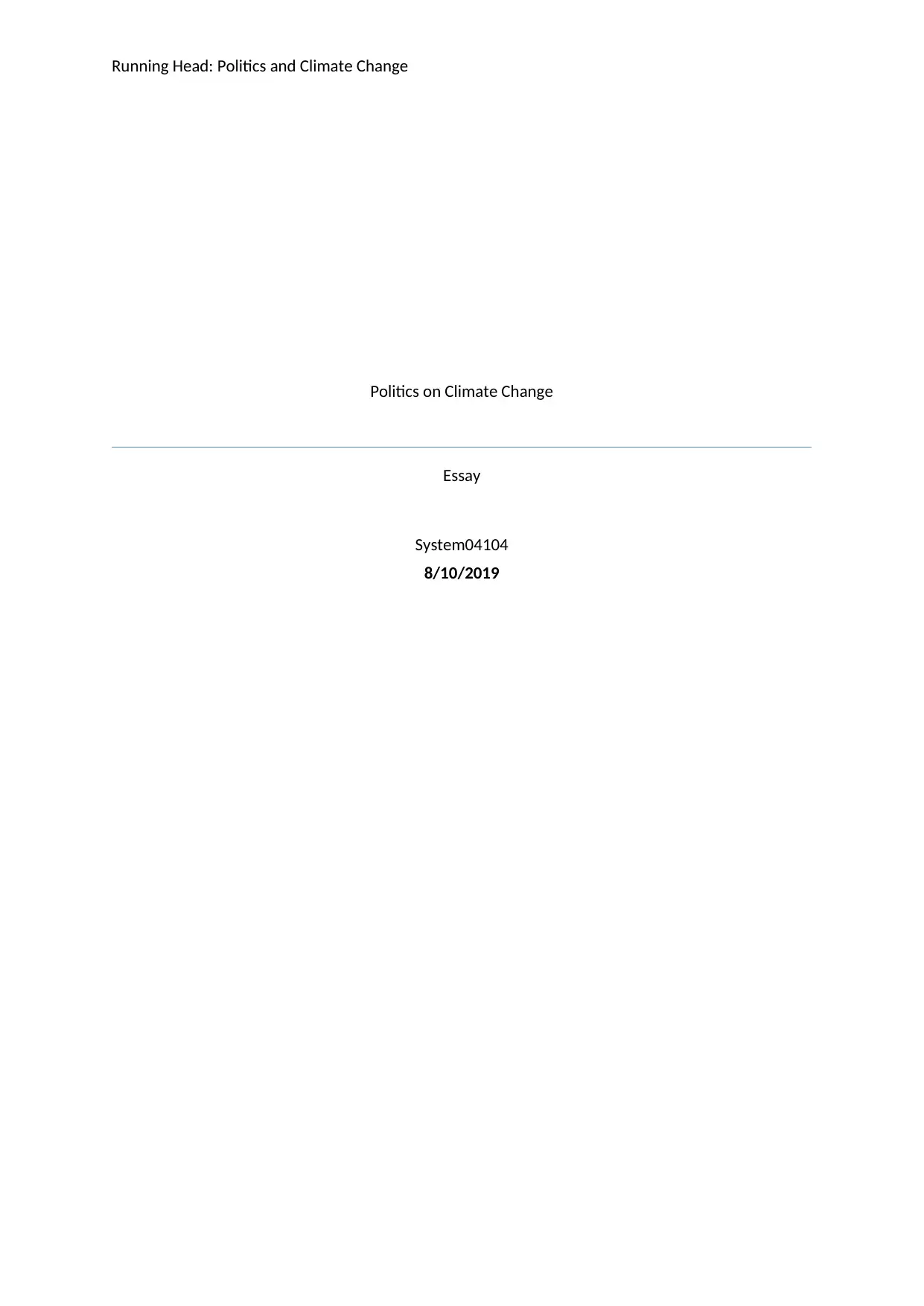
Running Head: Politics and Climate Change
Politics on Climate Change
Essay
System04104
8/10/2019
Politics on Climate Change
Essay
System04104
8/10/2019
Secure Best Marks with AI Grader
Need help grading? Try our AI Grader for instant feedback on your assignments.
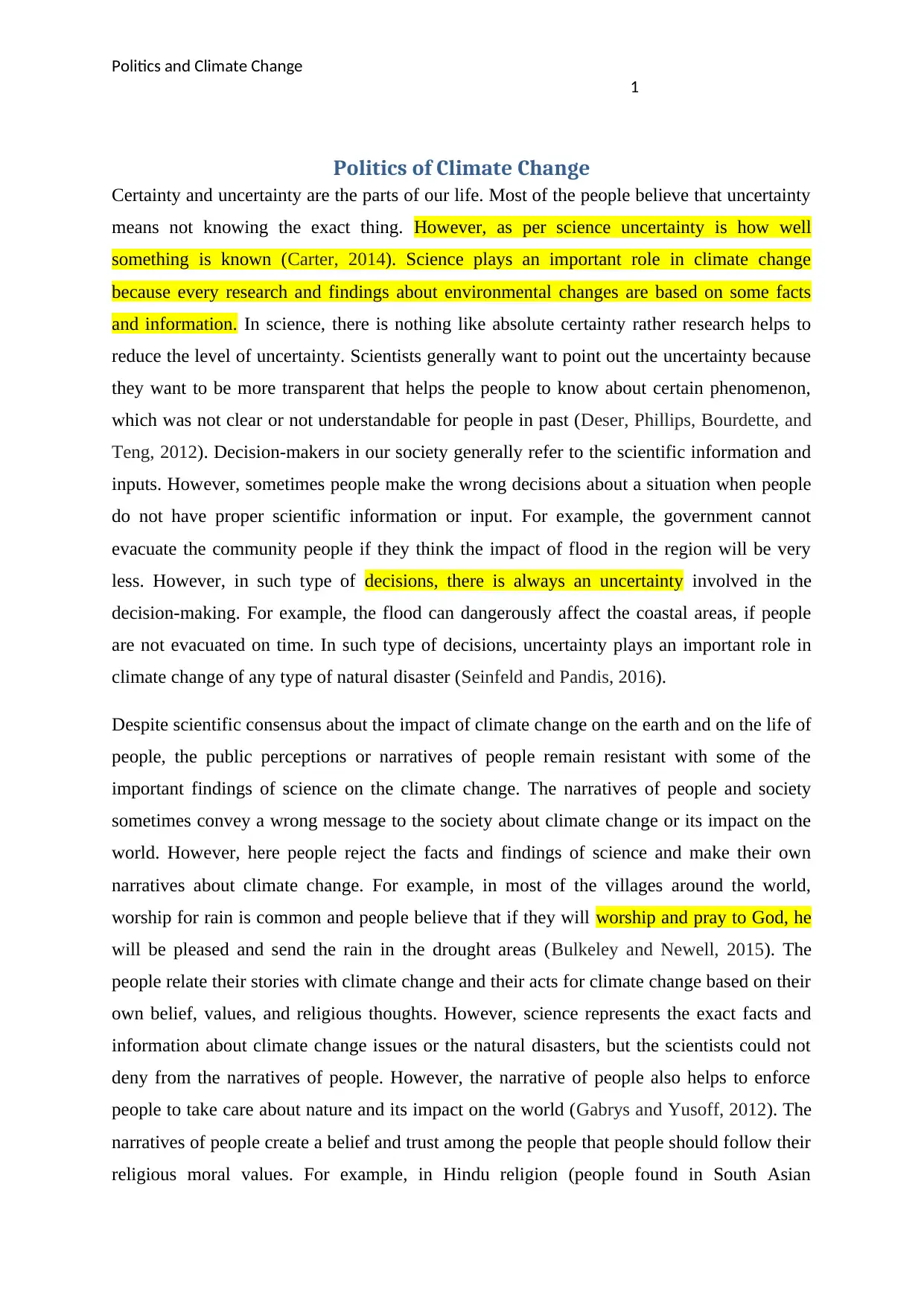
Politics and Climate Change
1
Politics of Climate Change
Certainty and uncertainty are the parts of our life. Most of the people believe that uncertainty
means not knowing the exact thing. However, as per science uncertainty is how well
something is known (Carter, 2014). Science plays an important role in climate change
because every research and findings about environmental changes are based on some facts
and information. In science, there is nothing like absolute certainty rather research helps to
reduce the level of uncertainty. Scientists generally want to point out the uncertainty because
they want to be more transparent that helps the people to know about certain phenomenon,
which was not clear or not understandable for people in past (Deser, Phillips, Bourdette, and
Teng, 2012). Decision-makers in our society generally refer to the scientific information and
inputs. However, sometimes people make the wrong decisions about a situation when people
do not have proper scientific information or input. For example, the government cannot
evacuate the community people if they think the impact of flood in the region will be very
less. However, in such type of decisions, there is always an uncertainty involved in the
decision-making. For example, the flood can dangerously affect the coastal areas, if people
are not evacuated on time. In such type of decisions, uncertainty plays an important role in
climate change of any type of natural disaster (Seinfeld and Pandis, 2016).
Despite scientific consensus about the impact of climate change on the earth and on the life of
people, the public perceptions or narratives of people remain resistant with some of the
important findings of science on the climate change. The narratives of people and society
sometimes convey a wrong message to the society about climate change or its impact on the
world. However, here people reject the facts and findings of science and make their own
narratives about climate change. For example, in most of the villages around the world,
worship for rain is common and people believe that if they will worship and pray to God, he
will be pleased and send the rain in the drought areas (Bulkeley and Newell, 2015). The
people relate their stories with climate change and their acts for climate change based on their
own belief, values, and religious thoughts. However, science represents the exact facts and
information about climate change issues or the natural disasters, but the scientists could not
deny from the narratives of people. However, the narrative of people also helps to enforce
people to take care about nature and its impact on the world (Gabrys and Yusoff, 2012). The
narratives of people create a belief and trust among the people that people should follow their
religious moral values. For example, in Hindu religion (people found in South Asian
1
Politics of Climate Change
Certainty and uncertainty are the parts of our life. Most of the people believe that uncertainty
means not knowing the exact thing. However, as per science uncertainty is how well
something is known (Carter, 2014). Science plays an important role in climate change
because every research and findings about environmental changes are based on some facts
and information. In science, there is nothing like absolute certainty rather research helps to
reduce the level of uncertainty. Scientists generally want to point out the uncertainty because
they want to be more transparent that helps the people to know about certain phenomenon,
which was not clear or not understandable for people in past (Deser, Phillips, Bourdette, and
Teng, 2012). Decision-makers in our society generally refer to the scientific information and
inputs. However, sometimes people make the wrong decisions about a situation when people
do not have proper scientific information or input. For example, the government cannot
evacuate the community people if they think the impact of flood in the region will be very
less. However, in such type of decisions, there is always an uncertainty involved in the
decision-making. For example, the flood can dangerously affect the coastal areas, if people
are not evacuated on time. In such type of decisions, uncertainty plays an important role in
climate change of any type of natural disaster (Seinfeld and Pandis, 2016).
Despite scientific consensus about the impact of climate change on the earth and on the life of
people, the public perceptions or narratives of people remain resistant with some of the
important findings of science on the climate change. The narratives of people and society
sometimes convey a wrong message to the society about climate change or its impact on the
world. However, here people reject the facts and findings of science and make their own
narratives about climate change. For example, in most of the villages around the world,
worship for rain is common and people believe that if they will worship and pray to God, he
will be pleased and send the rain in the drought areas (Bulkeley and Newell, 2015). The
people relate their stories with climate change and their acts for climate change based on their
own belief, values, and religious thoughts. However, science represents the exact facts and
information about climate change issues or the natural disasters, but the scientists could not
deny from the narratives of people. However, the narrative of people also helps to enforce
people to take care about nature and its impact on the world (Gabrys and Yusoff, 2012). The
narratives of people create a belief and trust among the people that people should follow their
religious moral values. For example, in Hindu religion (people found in South Asian
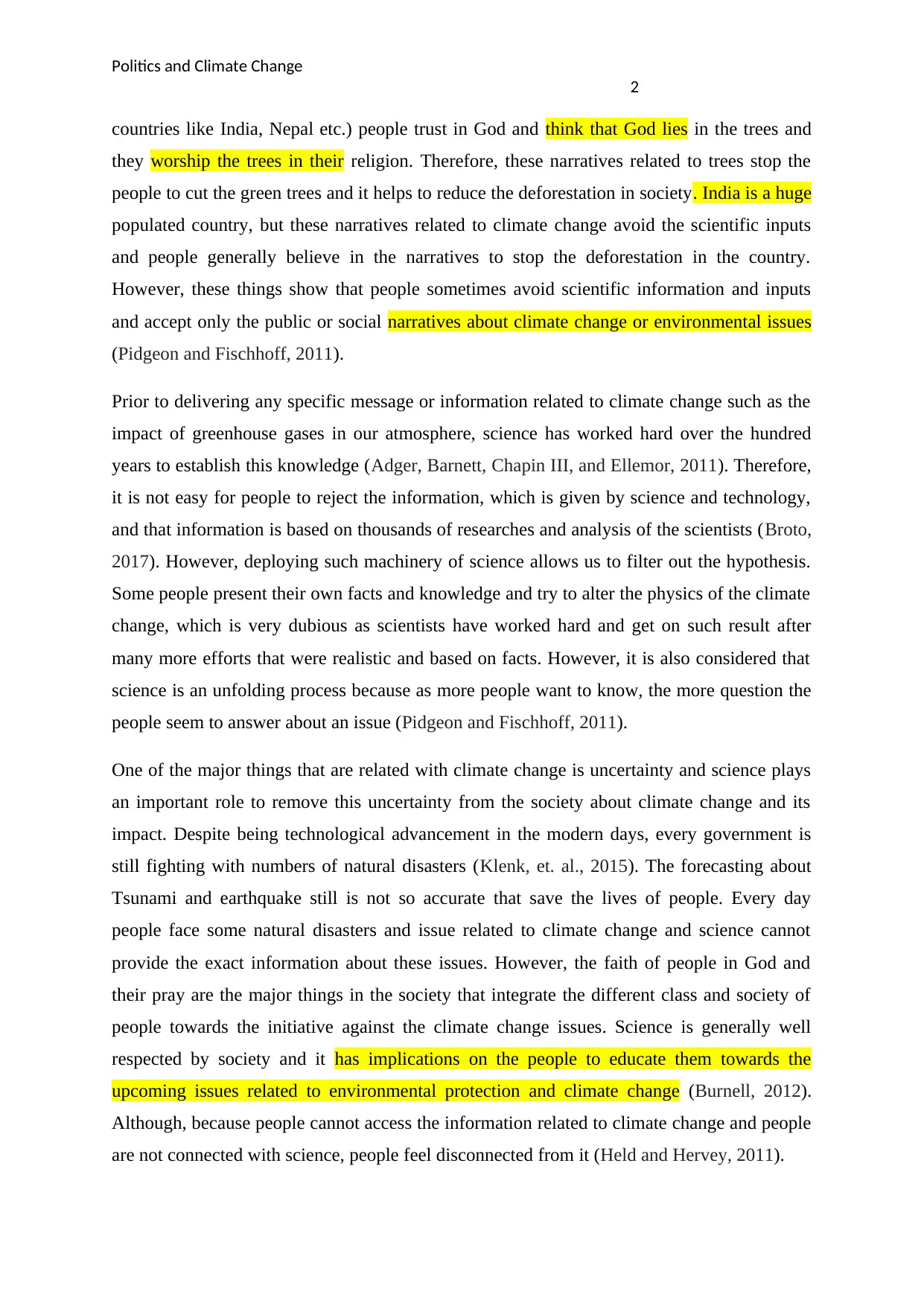
Politics and Climate Change
2
countries like India, Nepal etc.) people trust in God and think that God lies in the trees and
they worship the trees in their religion. Therefore, these narratives related to trees stop the
people to cut the green trees and it helps to reduce the deforestation in society. India is a huge
populated country, but these narratives related to climate change avoid the scientific inputs
and people generally believe in the narratives to stop the deforestation in the country.
However, these things show that people sometimes avoid scientific information and inputs
and accept only the public or social narratives about climate change or environmental issues
(Pidgeon and Fischhoff, 2011).
Prior to delivering any specific message or information related to climate change such as the
impact of greenhouse gases in our atmosphere, science has worked hard over the hundred
years to establish this knowledge (Adger, Barnett, Chapin III, and Ellemor, 2011). Therefore,
it is not easy for people to reject the information, which is given by science and technology,
and that information is based on thousands of researches and analysis of the scientists (Broto,
2017). However, deploying such machinery of science allows us to filter out the hypothesis.
Some people present their own facts and knowledge and try to alter the physics of the climate
change, which is very dubious as scientists have worked hard and get on such result after
many more efforts that were realistic and based on facts. However, it is also considered that
science is an unfolding process because as more people want to know, the more question the
people seem to answer about an issue (Pidgeon and Fischhoff, 2011).
One of the major things that are related with climate change is uncertainty and science plays
an important role to remove this uncertainty from the society about climate change and its
impact. Despite being technological advancement in the modern days, every government is
still fighting with numbers of natural disasters (Klenk, et. al., 2015). The forecasting about
Tsunami and earthquake still is not so accurate that save the lives of people. Every day
people face some natural disasters and issue related to climate change and science cannot
provide the exact information about these issues. However, the faith of people in God and
their pray are the major things in the society that integrate the different class and society of
people towards the initiative against the climate change issues. Science is generally well
respected by society and it has implications on the people to educate them towards the
upcoming issues related to environmental protection and climate change (Burnell, 2012).
Although, because people cannot access the information related to climate change and people
are not connected with science, people feel disconnected from it (Held and Hervey, 2011).
2
countries like India, Nepal etc.) people trust in God and think that God lies in the trees and
they worship the trees in their religion. Therefore, these narratives related to trees stop the
people to cut the green trees and it helps to reduce the deforestation in society. India is a huge
populated country, but these narratives related to climate change avoid the scientific inputs
and people generally believe in the narratives to stop the deforestation in the country.
However, these things show that people sometimes avoid scientific information and inputs
and accept only the public or social narratives about climate change or environmental issues
(Pidgeon and Fischhoff, 2011).
Prior to delivering any specific message or information related to climate change such as the
impact of greenhouse gases in our atmosphere, science has worked hard over the hundred
years to establish this knowledge (Adger, Barnett, Chapin III, and Ellemor, 2011). Therefore,
it is not easy for people to reject the information, which is given by science and technology,
and that information is based on thousands of researches and analysis of the scientists (Broto,
2017). However, deploying such machinery of science allows us to filter out the hypothesis.
Some people present their own facts and knowledge and try to alter the physics of the climate
change, which is very dubious as scientists have worked hard and get on such result after
many more efforts that were realistic and based on facts. However, it is also considered that
science is an unfolding process because as more people want to know, the more question the
people seem to answer about an issue (Pidgeon and Fischhoff, 2011).
One of the major things that are related with climate change is uncertainty and science plays
an important role to remove this uncertainty from the society about climate change and its
impact. Despite being technological advancement in the modern days, every government is
still fighting with numbers of natural disasters (Klenk, et. al., 2015). The forecasting about
Tsunami and earthquake still is not so accurate that save the lives of people. Every day
people face some natural disasters and issue related to climate change and science cannot
provide the exact information about these issues. However, the faith of people in God and
their pray are the major things in the society that integrate the different class and society of
people towards the initiative against the climate change issues. Science is generally well
respected by society and it has implications on the people to educate them towards the
upcoming issues related to environmental protection and climate change (Burnell, 2012).
Although, because people cannot access the information related to climate change and people
are not connected with science, people feel disconnected from it (Held and Hervey, 2011).
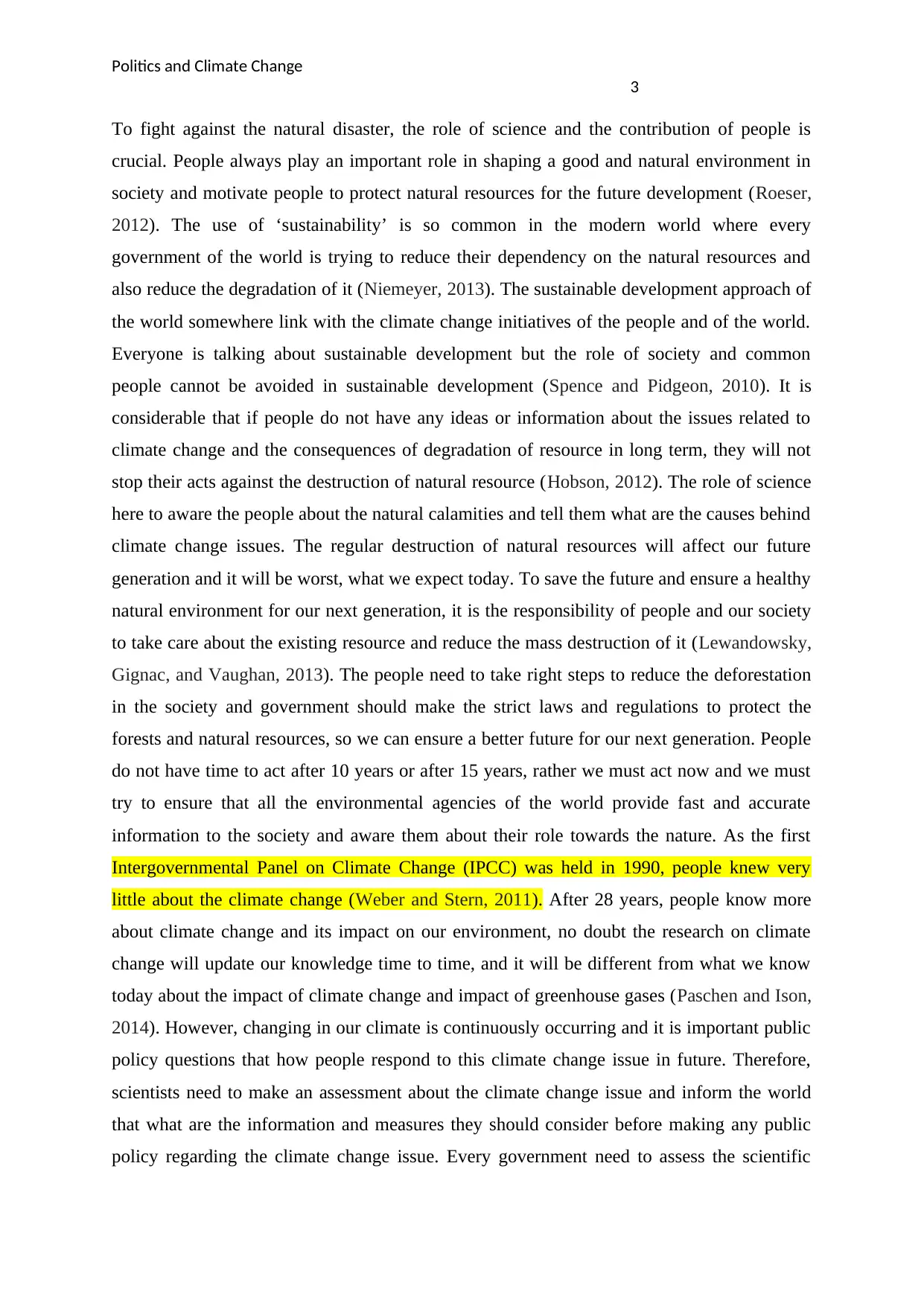
Politics and Climate Change
3
To fight against the natural disaster, the role of science and the contribution of people is
crucial. People always play an important role in shaping a good and natural environment in
society and motivate people to protect natural resources for the future development (Roeser,
2012). The use of ‘sustainability’ is so common in the modern world where every
government of the world is trying to reduce their dependency on the natural resources and
also reduce the degradation of it (Niemeyer, 2013). The sustainable development approach of
the world somewhere link with the climate change initiatives of the people and of the world.
Everyone is talking about sustainable development but the role of society and common
people cannot be avoided in sustainable development (Spence and Pidgeon, 2010). It is
considerable that if people do not have any ideas or information about the issues related to
climate change and the consequences of degradation of resource in long term, they will not
stop their acts against the destruction of natural resource (Hobson, 2012). The role of science
here to aware the people about the natural calamities and tell them what are the causes behind
climate change issues. The regular destruction of natural resources will affect our future
generation and it will be worst, what we expect today. To save the future and ensure a healthy
natural environment for our next generation, it is the responsibility of people and our society
to take care about the existing resource and reduce the mass destruction of it (Lewandowsky,
Gignac, and Vaughan, 2013). The people need to take right steps to reduce the deforestation
in the society and government should make the strict laws and regulations to protect the
forests and natural resources, so we can ensure a better future for our next generation. People
do not have time to act after 10 years or after 15 years, rather we must act now and we must
try to ensure that all the environmental agencies of the world provide fast and accurate
information to the society and aware them about their role towards the nature. As the first
Intergovernmental Panel on Climate Change (IPCC) was held in 1990, people knew very
little about the climate change (Weber and Stern, 2011). After 28 years, people know more
about climate change and its impact on our environment, no doubt the research on climate
change will update our knowledge time to time, and it will be different from what we know
today about the impact of climate change and impact of greenhouse gases (Paschen and Ison,
2014). However, changing in our climate is continuously occurring and it is important public
policy questions that how people respond to this climate change issue in future. Therefore,
scientists need to make an assessment about the climate change issue and inform the world
that what are the information and measures they should consider before making any public
policy regarding the climate change issue. Every government need to assess the scientific
3
To fight against the natural disaster, the role of science and the contribution of people is
crucial. People always play an important role in shaping a good and natural environment in
society and motivate people to protect natural resources for the future development (Roeser,
2012). The use of ‘sustainability’ is so common in the modern world where every
government of the world is trying to reduce their dependency on the natural resources and
also reduce the degradation of it (Niemeyer, 2013). The sustainable development approach of
the world somewhere link with the climate change initiatives of the people and of the world.
Everyone is talking about sustainable development but the role of society and common
people cannot be avoided in sustainable development (Spence and Pidgeon, 2010). It is
considerable that if people do not have any ideas or information about the issues related to
climate change and the consequences of degradation of resource in long term, they will not
stop their acts against the destruction of natural resource (Hobson, 2012). The role of science
here to aware the people about the natural calamities and tell them what are the causes behind
climate change issues. The regular destruction of natural resources will affect our future
generation and it will be worst, what we expect today. To save the future and ensure a healthy
natural environment for our next generation, it is the responsibility of people and our society
to take care about the existing resource and reduce the mass destruction of it (Lewandowsky,
Gignac, and Vaughan, 2013). The people need to take right steps to reduce the deforestation
in the society and government should make the strict laws and regulations to protect the
forests and natural resources, so we can ensure a better future for our next generation. People
do not have time to act after 10 years or after 15 years, rather we must act now and we must
try to ensure that all the environmental agencies of the world provide fast and accurate
information to the society and aware them about their role towards the nature. As the first
Intergovernmental Panel on Climate Change (IPCC) was held in 1990, people knew very
little about the climate change (Weber and Stern, 2011). After 28 years, people know more
about climate change and its impact on our environment, no doubt the research on climate
change will update our knowledge time to time, and it will be different from what we know
today about the impact of climate change and impact of greenhouse gases (Paschen and Ison,
2014). However, changing in our climate is continuously occurring and it is important public
policy questions that how people respond to this climate change issue in future. Therefore,
scientists need to make an assessment about the climate change issue and inform the world
that what are the information and measures they should consider before making any public
policy regarding the climate change issue. Every government need to assess the scientific
Paraphrase This Document
Need a fresh take? Get an instant paraphrase of this document with our AI Paraphraser
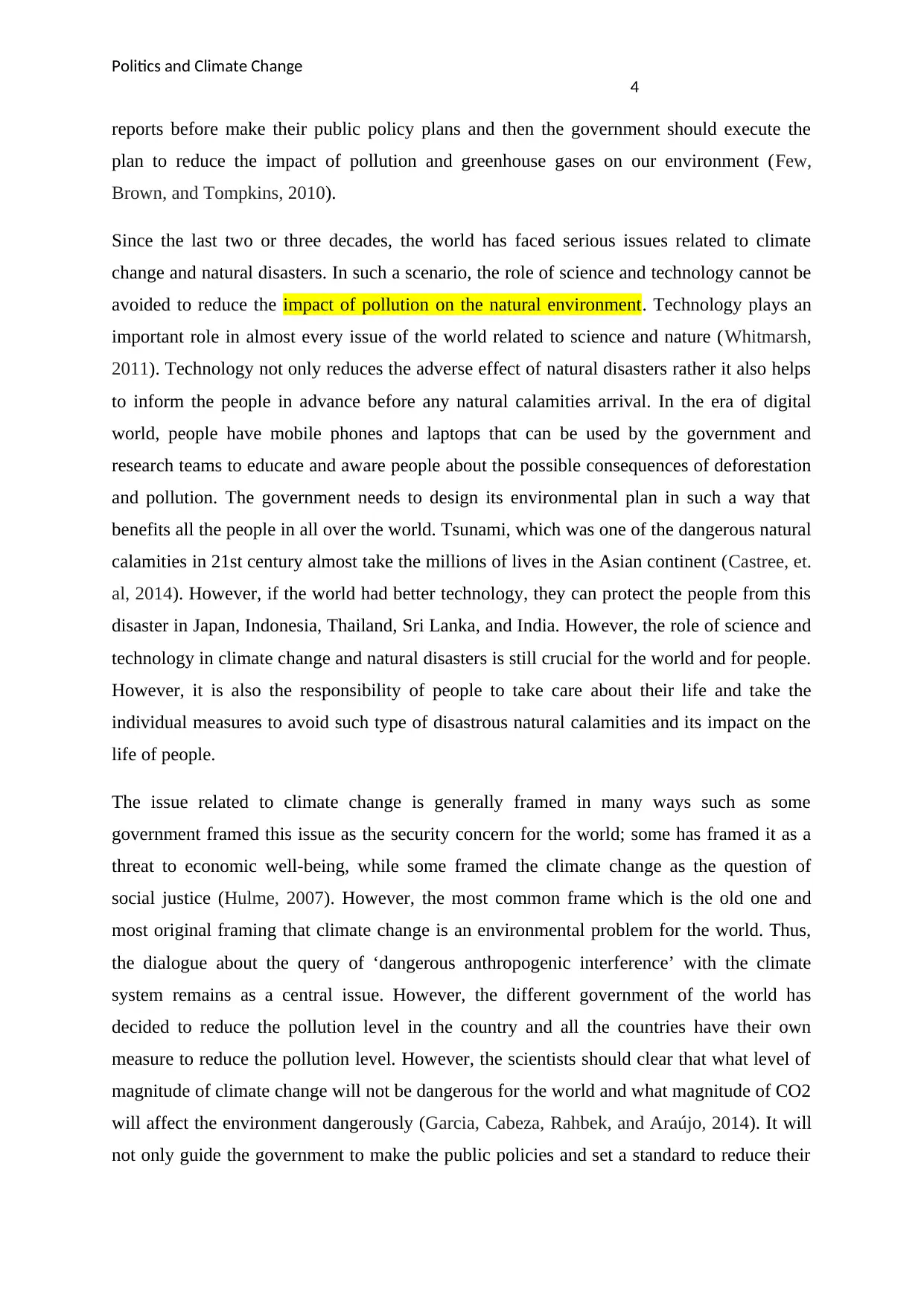
Politics and Climate Change
4
reports before make their public policy plans and then the government should execute the
plan to reduce the impact of pollution and greenhouse gases on our environment (Few,
Brown, and Tompkins, 2010).
Since the last two or three decades, the world has faced serious issues related to climate
change and natural disasters. In such a scenario, the role of science and technology cannot be
avoided to reduce the impact of pollution on the natural environment. Technology plays an
important role in almost every issue of the world related to science and nature (Whitmarsh,
2011). Technology not only reduces the adverse effect of natural disasters rather it also helps
to inform the people in advance before any natural calamities arrival. In the era of digital
world, people have mobile phones and laptops that can be used by the government and
research teams to educate and aware people about the possible consequences of deforestation
and pollution. The government needs to design its environmental plan in such a way that
benefits all the people in all over the world. Tsunami, which was one of the dangerous natural
calamities in 21st century almost take the millions of lives in the Asian continent (Castree, et.
al, 2014). However, if the world had better technology, they can protect the people from this
disaster in Japan, Indonesia, Thailand, Sri Lanka, and India. However, the role of science and
technology in climate change and natural disasters is still crucial for the world and for people.
However, it is also the responsibility of people to take care about their life and take the
individual measures to avoid such type of disastrous natural calamities and its impact on the
life of people.
The issue related to climate change is generally framed in many ways such as some
government framed this issue as the security concern for the world; some has framed it as a
threat to economic well-being, while some framed the climate change as the question of
social justice (Hulme, 2007). However, the most common frame which is the old one and
most original framing that climate change is an environmental problem for the world. Thus,
the dialogue about the query of ‘dangerous anthropogenic interference’ with the climate
system remains as a central issue. However, the different government of the world has
decided to reduce the pollution level in the country and all the countries have their own
measure to reduce the pollution level. However, the scientists should clear that what level of
magnitude of climate change will not be dangerous for the world and what magnitude of CO2
will affect the environment dangerously (Garcia, Cabeza, Rahbek, and Araújo, 2014). It will
not only guide the government to make the public policies and set a standard to reduce their
4
reports before make their public policy plans and then the government should execute the
plan to reduce the impact of pollution and greenhouse gases on our environment (Few,
Brown, and Tompkins, 2010).
Since the last two or three decades, the world has faced serious issues related to climate
change and natural disasters. In such a scenario, the role of science and technology cannot be
avoided to reduce the impact of pollution on the natural environment. Technology plays an
important role in almost every issue of the world related to science and nature (Whitmarsh,
2011). Technology not only reduces the adverse effect of natural disasters rather it also helps
to inform the people in advance before any natural calamities arrival. In the era of digital
world, people have mobile phones and laptops that can be used by the government and
research teams to educate and aware people about the possible consequences of deforestation
and pollution. The government needs to design its environmental plan in such a way that
benefits all the people in all over the world. Tsunami, which was one of the dangerous natural
calamities in 21st century almost take the millions of lives in the Asian continent (Castree, et.
al, 2014). However, if the world had better technology, they can protect the people from this
disaster in Japan, Indonesia, Thailand, Sri Lanka, and India. However, the role of science and
technology in climate change and natural disasters is still crucial for the world and for people.
However, it is also the responsibility of people to take care about their life and take the
individual measures to avoid such type of disastrous natural calamities and its impact on the
life of people.
The issue related to climate change is generally framed in many ways such as some
government framed this issue as the security concern for the world; some has framed it as a
threat to economic well-being, while some framed the climate change as the question of
social justice (Hulme, 2007). However, the most common frame which is the old one and
most original framing that climate change is an environmental problem for the world. Thus,
the dialogue about the query of ‘dangerous anthropogenic interference’ with the climate
system remains as a central issue. However, the different government of the world has
decided to reduce the pollution level in the country and all the countries have their own
measure to reduce the pollution level. However, the scientists should clear that what level of
magnitude of climate change will not be dangerous for the world and what magnitude of CO2
will affect the environment dangerously (Garcia, Cabeza, Rahbek, and Araújo, 2014). It will
not only guide the government to make the public policies and set a standard to reduce their
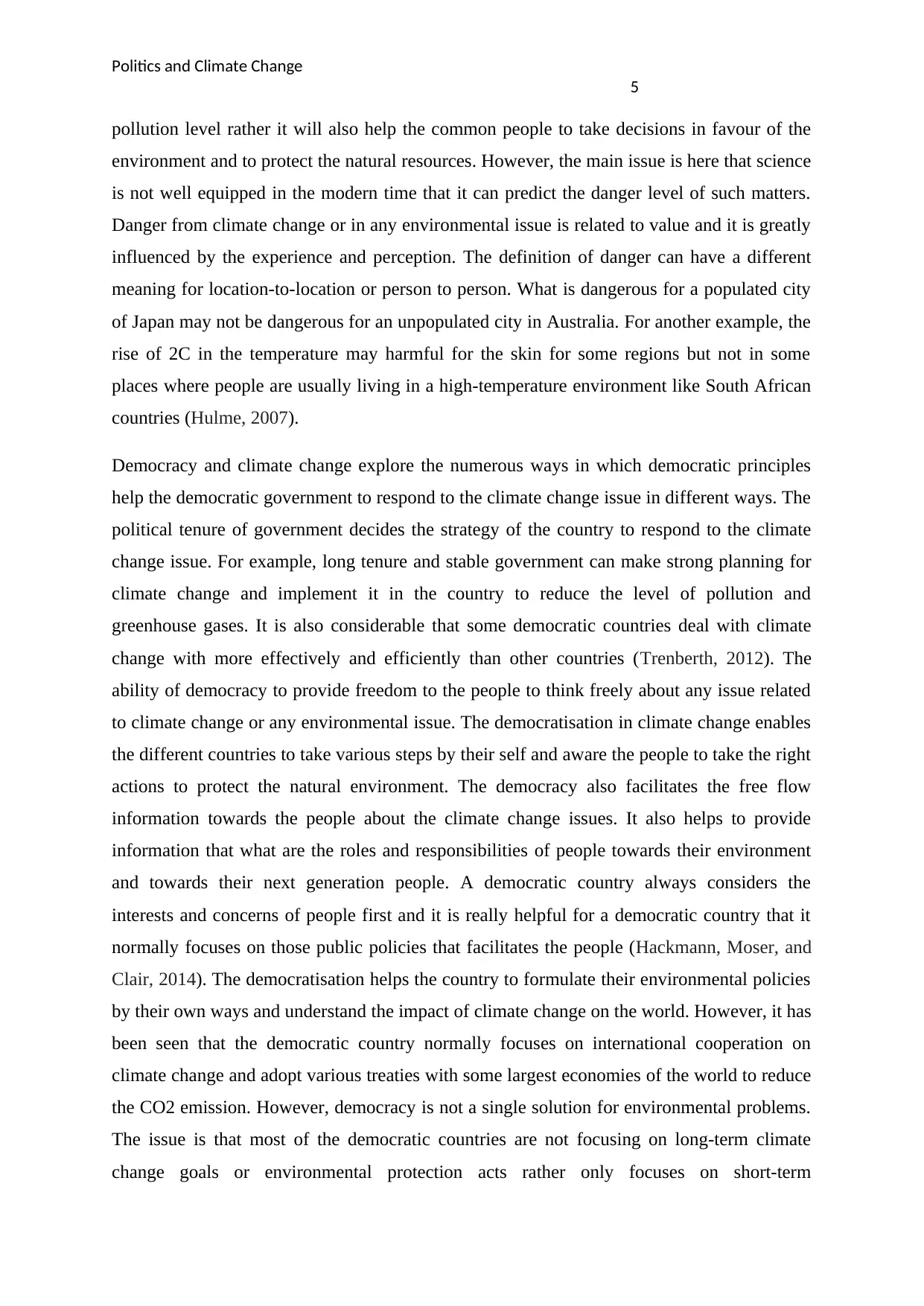
Politics and Climate Change
5
pollution level rather it will also help the common people to take decisions in favour of the
environment and to protect the natural resources. However, the main issue is here that science
is not well equipped in the modern time that it can predict the danger level of such matters.
Danger from climate change or in any environmental issue is related to value and it is greatly
influenced by the experience and perception. The definition of danger can have a different
meaning for location-to-location or person to person. What is dangerous for a populated city
of Japan may not be dangerous for an unpopulated city in Australia. For another example, the
rise of 2C in the temperature may harmful for the skin for some regions but not in some
places where people are usually living in a high-temperature environment like South African
countries (Hulme, 2007).
Democracy and climate change explore the numerous ways in which democratic principles
help the democratic government to respond to the climate change issue in different ways. The
political tenure of government decides the strategy of the country to respond to the climate
change issue. For example, long tenure and stable government can make strong planning for
climate change and implement it in the country to reduce the level of pollution and
greenhouse gases. It is also considerable that some democratic countries deal with climate
change with more effectively and efficiently than other countries (Trenberth, 2012). The
ability of democracy to provide freedom to the people to think freely about any issue related
to climate change or any environmental issue. The democratisation in climate change enables
the different countries to take various steps by their self and aware the people to take the right
actions to protect the natural environment. The democracy also facilitates the free flow
information towards the people about the climate change issues. It also helps to provide
information that what are the roles and responsibilities of people towards their environment
and towards their next generation people. A democratic country always considers the
interests and concerns of people first and it is really helpful for a democratic country that it
normally focuses on those public policies that facilitates the people (Hackmann, Moser, and
Clair, 2014). The democratisation helps the country to formulate their environmental policies
by their own ways and understand the impact of climate change on the world. However, it has
been seen that the democratic country normally focuses on international cooperation on
climate change and adopt various treaties with some largest economies of the world to reduce
the CO2 emission. However, democracy is not a single solution for environmental problems.
The issue is that most of the democratic countries are not focusing on long-term climate
change goals or environmental protection acts rather only focuses on short-term
5
pollution level rather it will also help the common people to take decisions in favour of the
environment and to protect the natural resources. However, the main issue is here that science
is not well equipped in the modern time that it can predict the danger level of such matters.
Danger from climate change or in any environmental issue is related to value and it is greatly
influenced by the experience and perception. The definition of danger can have a different
meaning for location-to-location or person to person. What is dangerous for a populated city
of Japan may not be dangerous for an unpopulated city in Australia. For another example, the
rise of 2C in the temperature may harmful for the skin for some regions but not in some
places where people are usually living in a high-temperature environment like South African
countries (Hulme, 2007).
Democracy and climate change explore the numerous ways in which democratic principles
help the democratic government to respond to the climate change issue in different ways. The
political tenure of government decides the strategy of the country to respond to the climate
change issue. For example, long tenure and stable government can make strong planning for
climate change and implement it in the country to reduce the level of pollution and
greenhouse gases. It is also considerable that some democratic countries deal with climate
change with more effectively and efficiently than other countries (Trenberth, 2012). The
ability of democracy to provide freedom to the people to think freely about any issue related
to climate change or any environmental issue. The democratisation in climate change enables
the different countries to take various steps by their self and aware the people to take the right
actions to protect the natural environment. The democracy also facilitates the free flow
information towards the people about the climate change issues. It also helps to provide
information that what are the roles and responsibilities of people towards their environment
and towards their next generation people. A democratic country always considers the
interests and concerns of people first and it is really helpful for a democratic country that it
normally focuses on those public policies that facilitates the people (Hackmann, Moser, and
Clair, 2014). The democratisation helps the country to formulate their environmental policies
by their own ways and understand the impact of climate change on the world. However, it has
been seen that the democratic country normally focuses on international cooperation on
climate change and adopt various treaties with some largest economies of the world to reduce
the CO2 emission. However, democracy is not a single solution for environmental problems.
The issue is that most of the democratic countries are not focusing on long-term climate
change goals or environmental protection acts rather only focuses on short-term
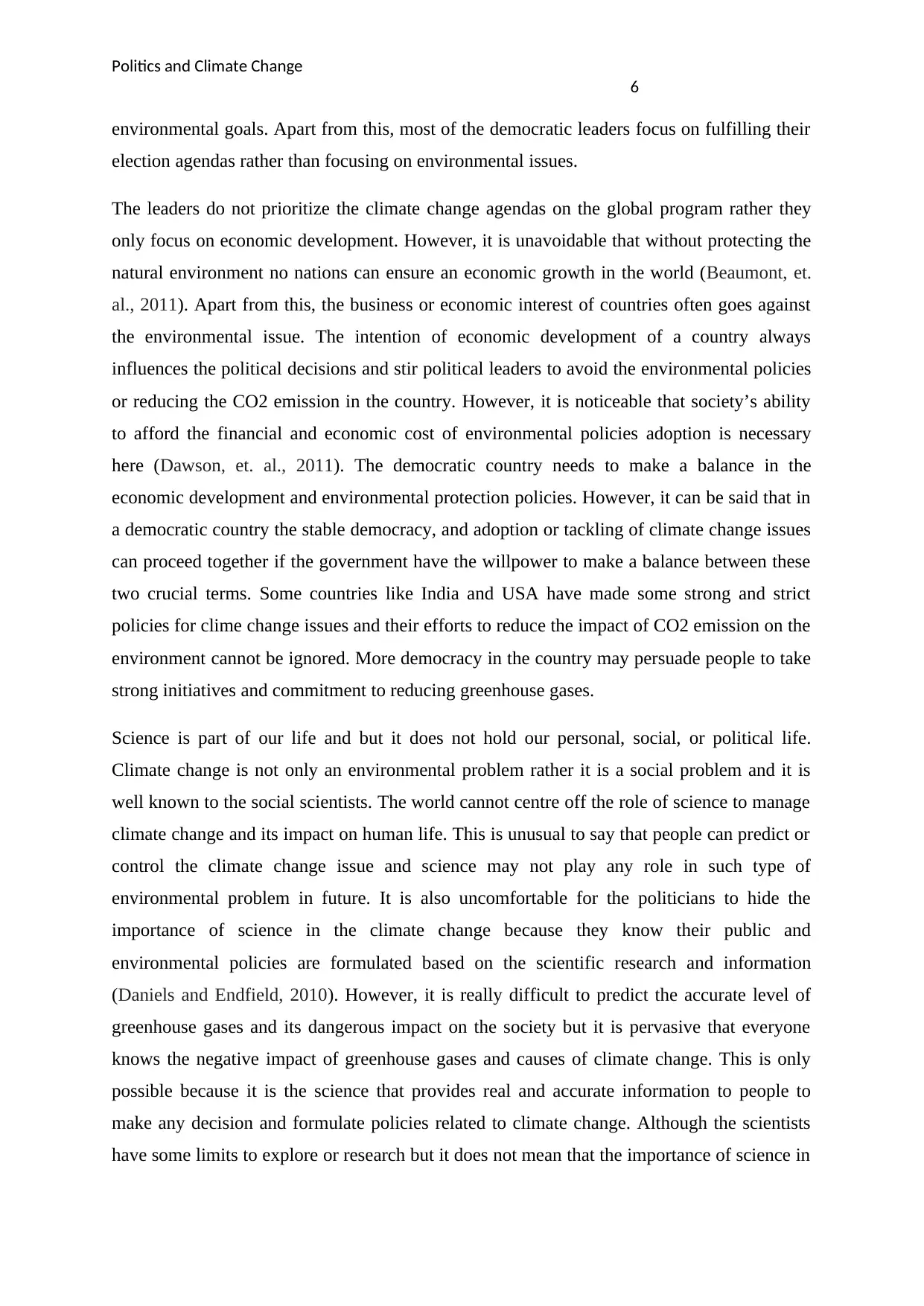
Politics and Climate Change
6
environmental goals. Apart from this, most of the democratic leaders focus on fulfilling their
election agendas rather than focusing on environmental issues.
The leaders do not prioritize the climate change agendas on the global program rather they
only focus on economic development. However, it is unavoidable that without protecting the
natural environment no nations can ensure an economic growth in the world (Beaumont, et.
al., 2011). Apart from this, the business or economic interest of countries often goes against
the environmental issue. The intention of economic development of a country always
influences the political decisions and stir political leaders to avoid the environmental policies
or reducing the CO2 emission in the country. However, it is noticeable that society’s ability
to afford the financial and economic cost of environmental policies adoption is necessary
here (Dawson, et. al., 2011). The democratic country needs to make a balance in the
economic development and environmental protection policies. However, it can be said that in
a democratic country the stable democracy, and adoption or tackling of climate change issues
can proceed together if the government have the willpower to make a balance between these
two crucial terms. Some countries like India and USA have made some strong and strict
policies for clime change issues and their efforts to reduce the impact of CO2 emission on the
environment cannot be ignored. More democracy in the country may persuade people to take
strong initiatives and commitment to reducing greenhouse gases.
Science is part of our life and but it does not hold our personal, social, or political life.
Climate change is not only an environmental problem rather it is a social problem and it is
well known to the social scientists. The world cannot centre off the role of science to manage
climate change and its impact on human life. This is unusual to say that people can predict or
control the climate change issue and science may not play any role in such type of
environmental problem in future. It is also uncomfortable for the politicians to hide the
importance of science in the climate change because they know their public and
environmental policies are formulated based on the scientific research and information
(Daniels and Endfield, 2010). However, it is really difficult to predict the accurate level of
greenhouse gases and its dangerous impact on the society but it is pervasive that everyone
knows the negative impact of greenhouse gases and causes of climate change. This is only
possible because it is the science that provides real and accurate information to people to
make any decision and formulate policies related to climate change. Although the scientists
have some limits to explore or research but it does not mean that the importance of science in
6
environmental goals. Apart from this, most of the democratic leaders focus on fulfilling their
election agendas rather than focusing on environmental issues.
The leaders do not prioritize the climate change agendas on the global program rather they
only focus on economic development. However, it is unavoidable that without protecting the
natural environment no nations can ensure an economic growth in the world (Beaumont, et.
al., 2011). Apart from this, the business or economic interest of countries often goes against
the environmental issue. The intention of economic development of a country always
influences the political decisions and stir political leaders to avoid the environmental policies
or reducing the CO2 emission in the country. However, it is noticeable that society’s ability
to afford the financial and economic cost of environmental policies adoption is necessary
here (Dawson, et. al., 2011). The democratic country needs to make a balance in the
economic development and environmental protection policies. However, it can be said that in
a democratic country the stable democracy, and adoption or tackling of climate change issues
can proceed together if the government have the willpower to make a balance between these
two crucial terms. Some countries like India and USA have made some strong and strict
policies for clime change issues and their efforts to reduce the impact of CO2 emission on the
environment cannot be ignored. More democracy in the country may persuade people to take
strong initiatives and commitment to reducing greenhouse gases.
Science is part of our life and but it does not hold our personal, social, or political life.
Climate change is not only an environmental problem rather it is a social problem and it is
well known to the social scientists. The world cannot centre off the role of science to manage
climate change and its impact on human life. This is unusual to say that people can predict or
control the climate change issue and science may not play any role in such type of
environmental problem in future. It is also uncomfortable for the politicians to hide the
importance of science in the climate change because they know their public and
environmental policies are formulated based on the scientific research and information
(Daniels and Endfield, 2010). However, it is really difficult to predict the accurate level of
greenhouse gases and its dangerous impact on the society but it is pervasive that everyone
knows the negative impact of greenhouse gases and causes of climate change. This is only
possible because it is the science that provides real and accurate information to people to
make any decision and formulate policies related to climate change. Although the scientists
have some limits to explore or research but it does not mean that the importance of science in
Secure Best Marks with AI Grader
Need help grading? Try our AI Grader for instant feedback on your assignments.
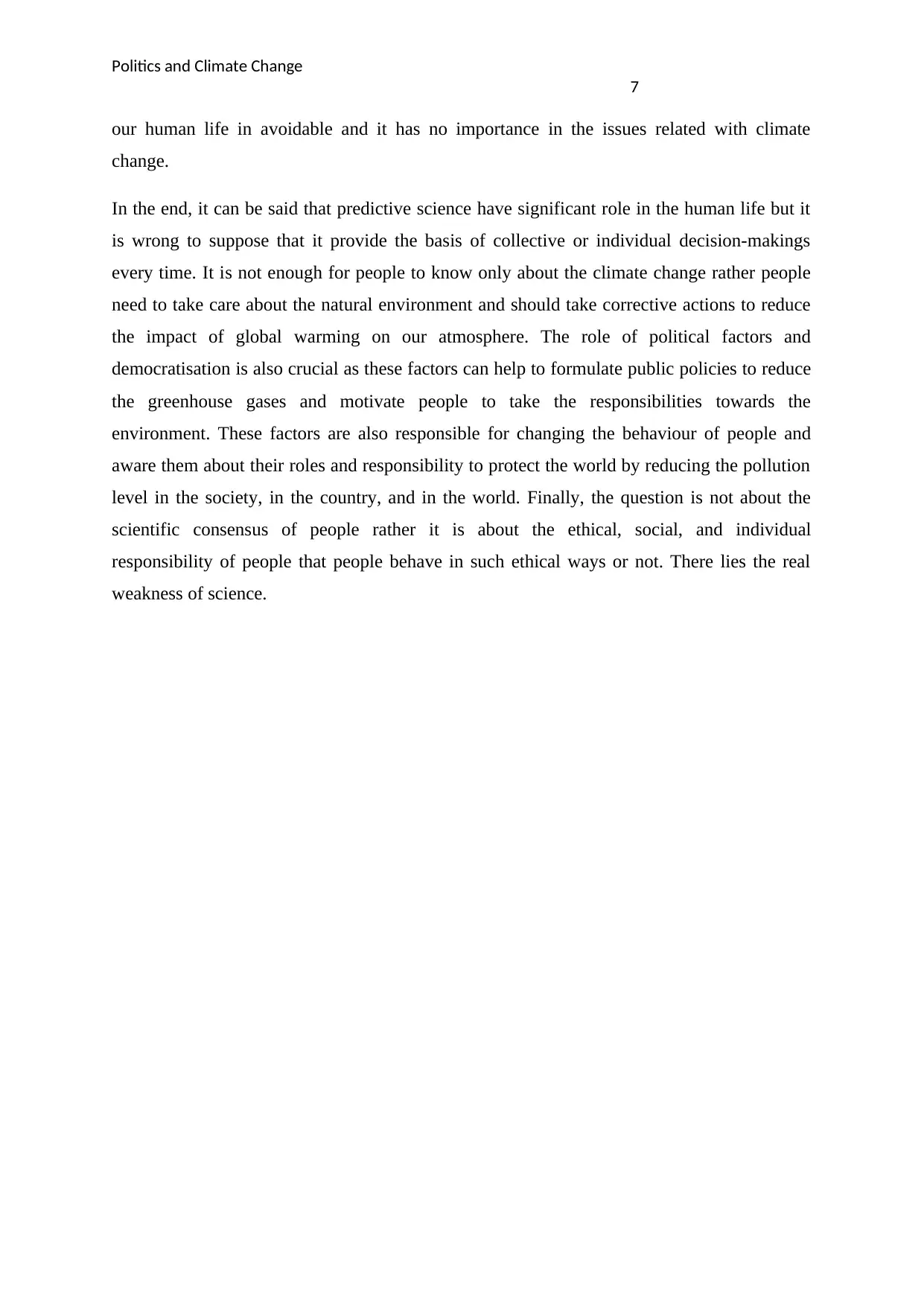
Politics and Climate Change
7
our human life in avoidable and it has no importance in the issues related with climate
change.
In the end, it can be said that predictive science have significant role in the human life but it
is wrong to suppose that it provide the basis of collective or individual decision-makings
every time. It is not enough for people to know only about the climate change rather people
need to take care about the natural environment and should take corrective actions to reduce
the impact of global warming on our atmosphere. The role of political factors and
democratisation is also crucial as these factors can help to formulate public policies to reduce
the greenhouse gases and motivate people to take the responsibilities towards the
environment. These factors are also responsible for changing the behaviour of people and
aware them about their roles and responsibility to protect the world by reducing the pollution
level in the society, in the country, and in the world. Finally, the question is not about the
scientific consensus of people rather it is about the ethical, social, and individual
responsibility of people that people behave in such ethical ways or not. There lies the real
weakness of science.
7
our human life in avoidable and it has no importance in the issues related with climate
change.
In the end, it can be said that predictive science have significant role in the human life but it
is wrong to suppose that it provide the basis of collective or individual decision-makings
every time. It is not enough for people to know only about the climate change rather people
need to take care about the natural environment and should take corrective actions to reduce
the impact of global warming on our atmosphere. The role of political factors and
democratisation is also crucial as these factors can help to formulate public policies to reduce
the greenhouse gases and motivate people to take the responsibilities towards the
environment. These factors are also responsible for changing the behaviour of people and
aware them about their roles and responsibility to protect the world by reducing the pollution
level in the society, in the country, and in the world. Finally, the question is not about the
scientific consensus of people rather it is about the ethical, social, and individual
responsibility of people that people behave in such ethical ways or not. There lies the real
weakness of science.
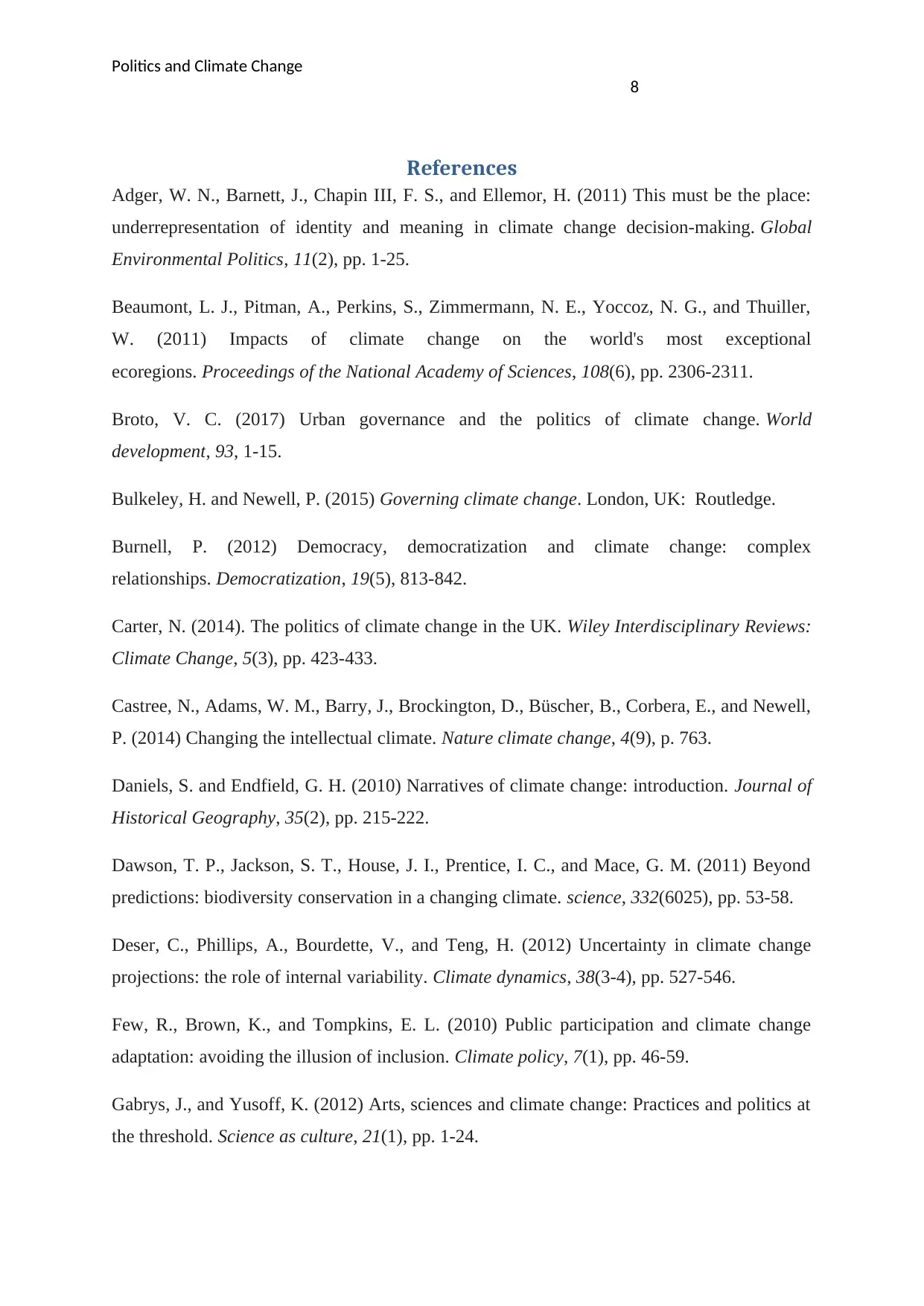
Politics and Climate Change
8
References
Adger, W. N., Barnett, J., Chapin III, F. S., and Ellemor, H. (2011) This must be the place:
underrepresentation of identity and meaning in climate change decision-making. Global
Environmental Politics, 11(2), pp. 1-25.
Beaumont, L. J., Pitman, A., Perkins, S., Zimmermann, N. E., Yoccoz, N. G., and Thuiller,
W. (2011) Impacts of climate change on the world's most exceptional
ecoregions. Proceedings of the National Academy of Sciences, 108(6), pp. 2306-2311.
Broto, V. C. (2017) Urban governance and the politics of climate change. World
development, 93, 1-15.
Bulkeley, H. and Newell, P. (2015) Governing climate change. London, UK: Routledge.
Burnell, P. (2012) Democracy, democratization and climate change: complex
relationships. Democratization, 19(5), 813-842.
Carter, N. (2014). The politics of climate change in the UK. Wiley Interdisciplinary Reviews:
Climate Change, 5(3), pp. 423-433.
Castree, N., Adams, W. M., Barry, J., Brockington, D., Büscher, B., Corbera, E., and Newell,
P. (2014) Changing the intellectual climate. Nature climate change, 4(9), p. 763.
Daniels, S. and Endfield, G. H. (2010) Narratives of climate change: introduction. Journal of
Historical Geography, 35(2), pp. 215-222.
Dawson, T. P., Jackson, S. T., House, J. I., Prentice, I. C., and Mace, G. M. (2011) Beyond
predictions: biodiversity conservation in a changing climate. science, 332(6025), pp. 53-58.
Deser, C., Phillips, A., Bourdette, V., and Teng, H. (2012) Uncertainty in climate change
projections: the role of internal variability. Climate dynamics, 38(3-4), pp. 527-546.
Few, R., Brown, K., and Tompkins, E. L. (2010) Public participation and climate change
adaptation: avoiding the illusion of inclusion. Climate policy, 7(1), pp. 46-59.
Gabrys, J., and Yusoff, K. (2012) Arts, sciences and climate change: Practices and politics at
the threshold. Science as culture, 21(1), pp. 1-24.
8
References
Adger, W. N., Barnett, J., Chapin III, F. S., and Ellemor, H. (2011) This must be the place:
underrepresentation of identity and meaning in climate change decision-making. Global
Environmental Politics, 11(2), pp. 1-25.
Beaumont, L. J., Pitman, A., Perkins, S., Zimmermann, N. E., Yoccoz, N. G., and Thuiller,
W. (2011) Impacts of climate change on the world's most exceptional
ecoregions. Proceedings of the National Academy of Sciences, 108(6), pp. 2306-2311.
Broto, V. C. (2017) Urban governance and the politics of climate change. World
development, 93, 1-15.
Bulkeley, H. and Newell, P. (2015) Governing climate change. London, UK: Routledge.
Burnell, P. (2012) Democracy, democratization and climate change: complex
relationships. Democratization, 19(5), 813-842.
Carter, N. (2014). The politics of climate change in the UK. Wiley Interdisciplinary Reviews:
Climate Change, 5(3), pp. 423-433.
Castree, N., Adams, W. M., Barry, J., Brockington, D., Büscher, B., Corbera, E., and Newell,
P. (2014) Changing the intellectual climate. Nature climate change, 4(9), p. 763.
Daniels, S. and Endfield, G. H. (2010) Narratives of climate change: introduction. Journal of
Historical Geography, 35(2), pp. 215-222.
Dawson, T. P., Jackson, S. T., House, J. I., Prentice, I. C., and Mace, G. M. (2011) Beyond
predictions: biodiversity conservation in a changing climate. science, 332(6025), pp. 53-58.
Deser, C., Phillips, A., Bourdette, V., and Teng, H. (2012) Uncertainty in climate change
projections: the role of internal variability. Climate dynamics, 38(3-4), pp. 527-546.
Few, R., Brown, K., and Tompkins, E. L. (2010) Public participation and climate change
adaptation: avoiding the illusion of inclusion. Climate policy, 7(1), pp. 46-59.
Gabrys, J., and Yusoff, K. (2012) Arts, sciences and climate change: Practices and politics at
the threshold. Science as culture, 21(1), pp. 1-24.
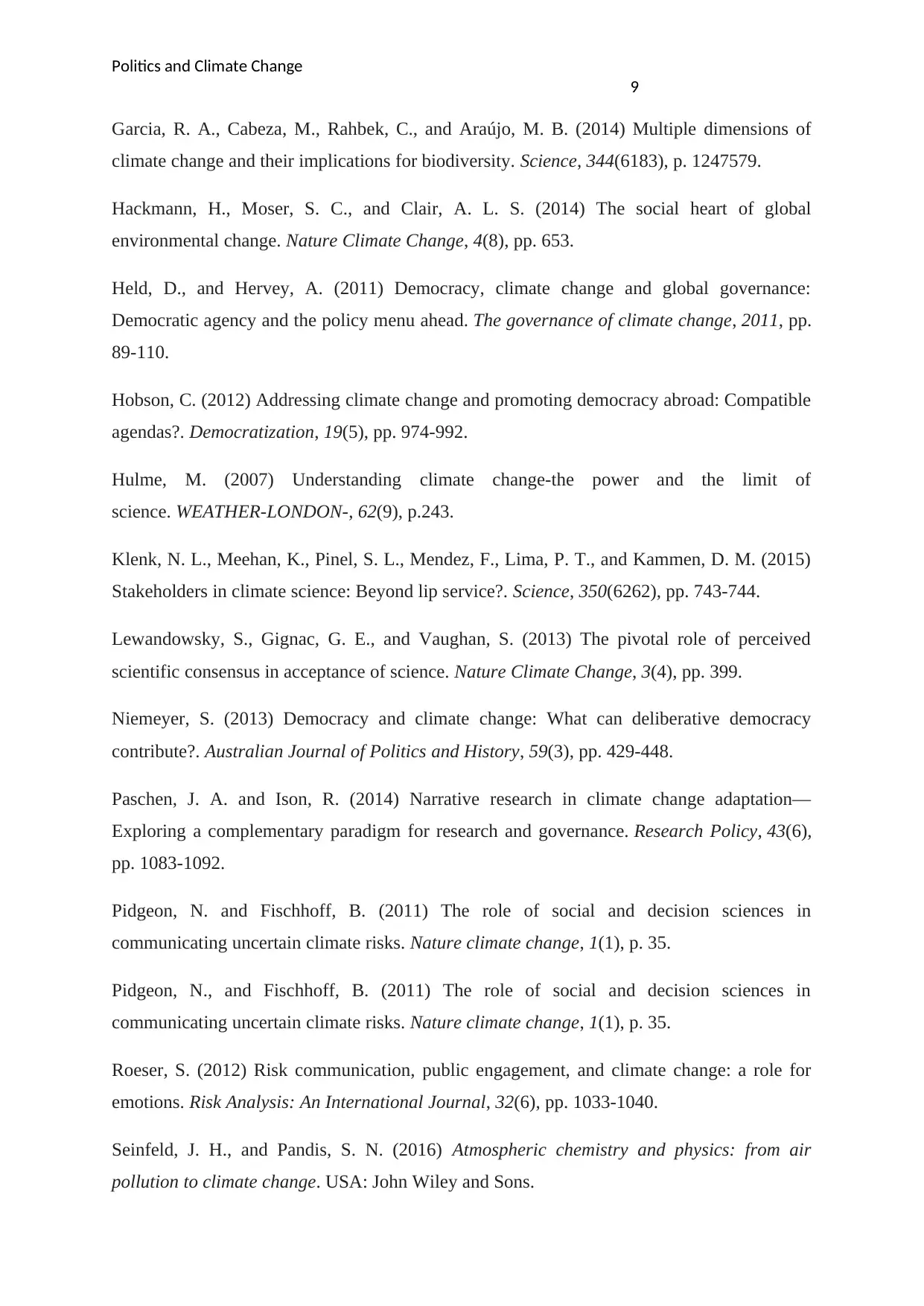
Politics and Climate Change
9
Garcia, R. A., Cabeza, M., Rahbek, C., and Araújo, M. B. (2014) Multiple dimensions of
climate change and their implications for biodiversity. Science, 344(6183), p. 1247579.
Hackmann, H., Moser, S. C., and Clair, A. L. S. (2014) The social heart of global
environmental change. Nature Climate Change, 4(8), pp. 653.
Held, D., and Hervey, A. (2011) Democracy, climate change and global governance:
Democratic agency and the policy menu ahead. The governance of climate change, 2011, pp.
89-110.
Hobson, C. (2012) Addressing climate change and promoting democracy abroad: Compatible
agendas?. Democratization, 19(5), pp. 974-992.
Hulme, M. (2007) Understanding climate change-the power and the limit of
science. WEATHER-LONDON-, 62(9), p.243.
Klenk, N. L., Meehan, K., Pinel, S. L., Mendez, F., Lima, P. T., and Kammen, D. M. (2015)
Stakeholders in climate science: Beyond lip service?. Science, 350(6262), pp. 743-744.
Lewandowsky, S., Gignac, G. E., and Vaughan, S. (2013) The pivotal role of perceived
scientific consensus in acceptance of science. Nature Climate Change, 3(4), pp. 399.
Niemeyer, S. (2013) Democracy and climate change: What can deliberative democracy
contribute?. Australian Journal of Politics and History, 59(3), pp. 429-448.
Paschen, J. A. and Ison, R. (2014) Narrative research in climate change adaptation—
Exploring a complementary paradigm for research and governance. Research Policy, 43(6),
pp. 1083-1092.
Pidgeon, N. and Fischhoff, B. (2011) The role of social and decision sciences in
communicating uncertain climate risks. Nature climate change, 1(1), p. 35.
Pidgeon, N., and Fischhoff, B. (2011) The role of social and decision sciences in
communicating uncertain climate risks. Nature climate change, 1(1), p. 35.
Roeser, S. (2012) Risk communication, public engagement, and climate change: a role for
emotions. Risk Analysis: An International Journal, 32(6), pp. 1033-1040.
Seinfeld, J. H., and Pandis, S. N. (2016) Atmospheric chemistry and physics: from air
pollution to climate change. USA: John Wiley and Sons.
9
Garcia, R. A., Cabeza, M., Rahbek, C., and Araújo, M. B. (2014) Multiple dimensions of
climate change and their implications for biodiversity. Science, 344(6183), p. 1247579.
Hackmann, H., Moser, S. C., and Clair, A. L. S. (2014) The social heart of global
environmental change. Nature Climate Change, 4(8), pp. 653.
Held, D., and Hervey, A. (2011) Democracy, climate change and global governance:
Democratic agency and the policy menu ahead. The governance of climate change, 2011, pp.
89-110.
Hobson, C. (2012) Addressing climate change and promoting democracy abroad: Compatible
agendas?. Democratization, 19(5), pp. 974-992.
Hulme, M. (2007) Understanding climate change-the power and the limit of
science. WEATHER-LONDON-, 62(9), p.243.
Klenk, N. L., Meehan, K., Pinel, S. L., Mendez, F., Lima, P. T., and Kammen, D. M. (2015)
Stakeholders in climate science: Beyond lip service?. Science, 350(6262), pp. 743-744.
Lewandowsky, S., Gignac, G. E., and Vaughan, S. (2013) The pivotal role of perceived
scientific consensus in acceptance of science. Nature Climate Change, 3(4), pp. 399.
Niemeyer, S. (2013) Democracy and climate change: What can deliberative democracy
contribute?. Australian Journal of Politics and History, 59(3), pp. 429-448.
Paschen, J. A. and Ison, R. (2014) Narrative research in climate change adaptation—
Exploring a complementary paradigm for research and governance. Research Policy, 43(6),
pp. 1083-1092.
Pidgeon, N. and Fischhoff, B. (2011) The role of social and decision sciences in
communicating uncertain climate risks. Nature climate change, 1(1), p. 35.
Pidgeon, N., and Fischhoff, B. (2011) The role of social and decision sciences in
communicating uncertain climate risks. Nature climate change, 1(1), p. 35.
Roeser, S. (2012) Risk communication, public engagement, and climate change: a role for
emotions. Risk Analysis: An International Journal, 32(6), pp. 1033-1040.
Seinfeld, J. H., and Pandis, S. N. (2016) Atmospheric chemistry and physics: from air
pollution to climate change. USA: John Wiley and Sons.
Paraphrase This Document
Need a fresh take? Get an instant paraphrase of this document with our AI Paraphraser
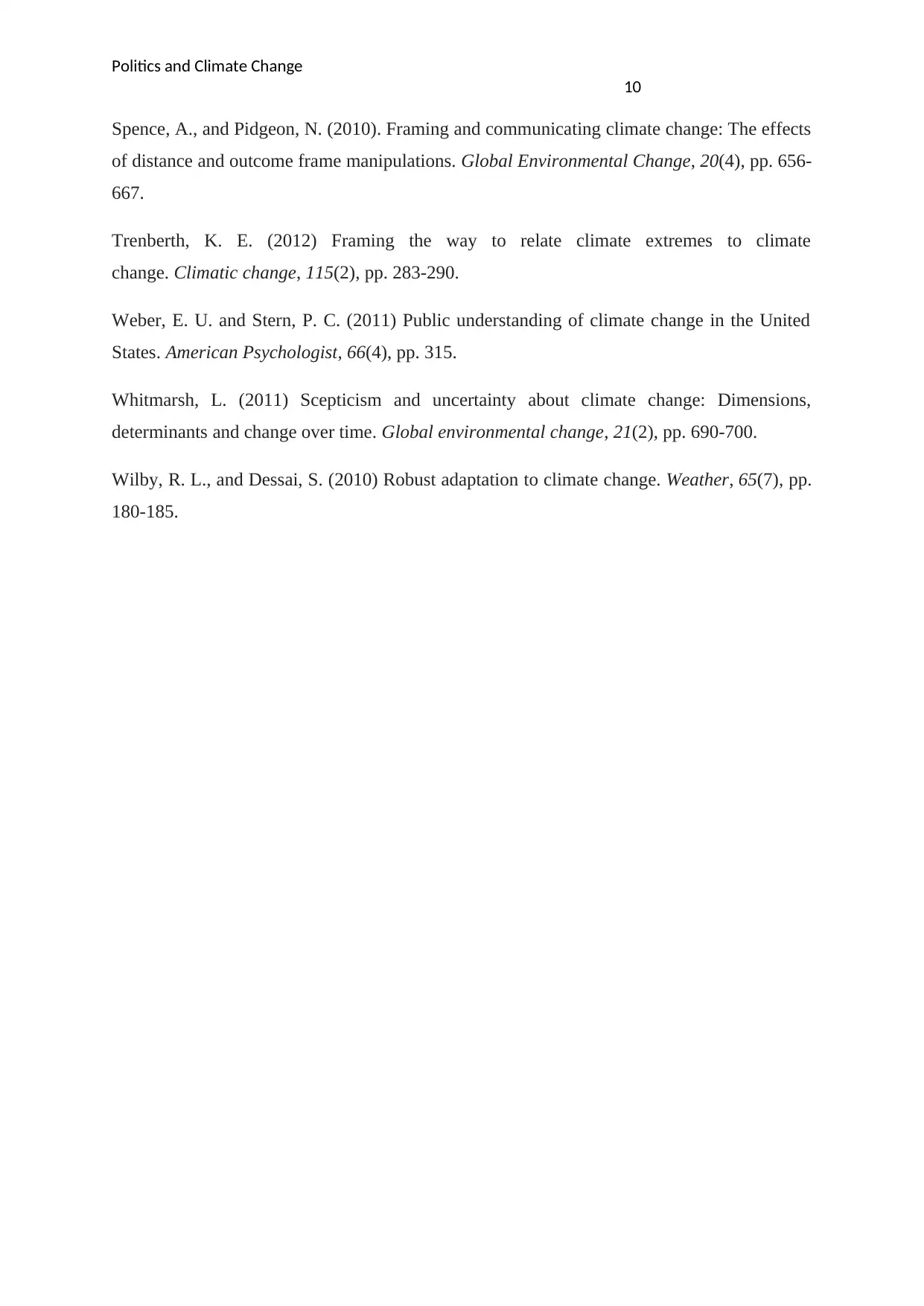
Politics and Climate Change
10
Spence, A., and Pidgeon, N. (2010). Framing and communicating climate change: The effects
of distance and outcome frame manipulations. Global Environmental Change, 20(4), pp. 656-
667.
Trenberth, K. E. (2012) Framing the way to relate climate extremes to climate
change. Climatic change, 115(2), pp. 283-290.
Weber, E. U. and Stern, P. C. (2011) Public understanding of climate change in the United
States. American Psychologist, 66(4), pp. 315.
Whitmarsh, L. (2011) Scepticism and uncertainty about climate change: Dimensions,
determinants and change over time. Global environmental change, 21(2), pp. 690-700.
Wilby, R. L., and Dessai, S. (2010) Robust adaptation to climate change. Weather, 65(7), pp.
180-185.
10
Spence, A., and Pidgeon, N. (2010). Framing and communicating climate change: The effects
of distance and outcome frame manipulations. Global Environmental Change, 20(4), pp. 656-
667.
Trenberth, K. E. (2012) Framing the way to relate climate extremes to climate
change. Climatic change, 115(2), pp. 283-290.
Weber, E. U. and Stern, P. C. (2011) Public understanding of climate change in the United
States. American Psychologist, 66(4), pp. 315.
Whitmarsh, L. (2011) Scepticism and uncertainty about climate change: Dimensions,
determinants and change over time. Global environmental change, 21(2), pp. 690-700.
Wilby, R. L., and Dessai, S. (2010) Robust adaptation to climate change. Weather, 65(7), pp.
180-185.
1 out of 11
![[object Object]](/_next/static/media/star-bottom.7253800d.svg)